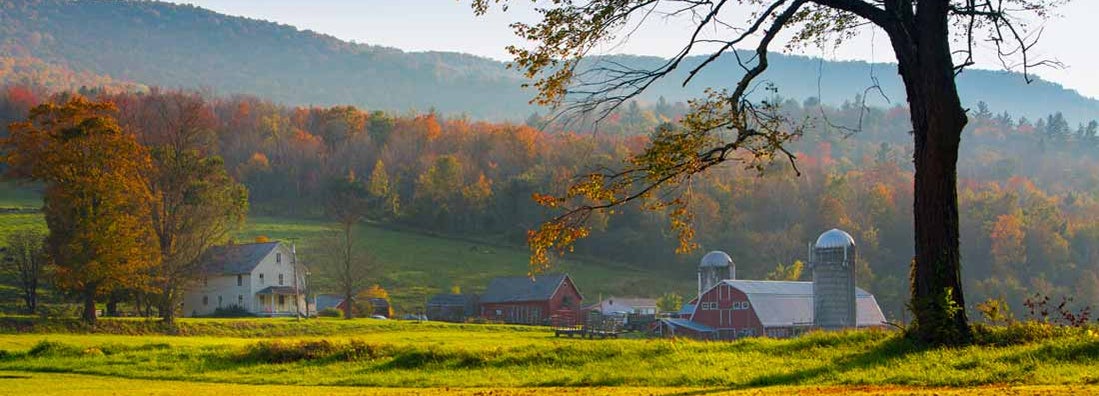Agribusiness Umbrella Insurance
(Because sometimes extra protection can make all the difference to your business)

Candace Jenkins is a licensed insurance advisor with over a decade of experience. She is also a writer and loves to write on all things insurance. Candace writes for TrustedChoice.com on a continuous basis and is here with the facts about all your insurance inquiries.

When your farm is both your home and your business, you've got a lot riding on it. And having the right coverage in place is key. Sometimes that means having a little extra protection from an umbrella policy that can extend your coverage limits and help keep the tractors rolling. An independent insurance agent is exactly what you need in your corner.
Your independent insurance agent is a knowledgeable resource when it comes to insuring your agribusiness, including extending your protection with an umbrella policy. Knowing how coverage works is important, so let's start with a little background to get you off on the right foot.
How to Insure Your Agribusiness with an Umbrella Policy
Insuring your farm is one thing, but making sure you have enough coverage for the road ahead can be daunting. Your agribusiness may need to be protected for additional bodily injury and property damage that exceeds your underlying policies. When running a farm business, time is of the essence, and making sure your policy responds when you need it most is essential.
First, you'll need to have your independent insurance agent look at pricing and coverages for your farm's specifications. So whether you have a farm that's small potatoes or a growing alfalfa empire, your coverage needs to apply adequately.
Your independent insurance agent will need to know the following to get started:
- Your farm's specifics: What does your farm yield in crops, livestock, and other products? How many pieces of machinery and farm equipment does your farm have? Who operates the machinery? Does your farm use pesticides and chemicals for crops? Does your farm let the public have access to it? What's the gross annual revenue of your farm? What's the whole farm worth?
- What preemptive protection do you have in place: Are there proper protocols in place to keep the public off premises or make sure they are following proper safety rules? Is livestock properly penned to keep them from escaping? Does farm equipment and machinery remain disengaged and locked down when not in use? Are there security cameras throughout the farm?
When to Get Umbrella Insurance
When it comes to insuring your farm the right way, you really can't do it soon enough. The longer you wait to insure or insure properly, the more things could go wrong without coverage. There are independent insurance agents who know how to insure your farm and what exposures could be a potential threat down the road.
Let's say someone wanders onto your not-so-secure farm and decides to take a joy ride on one of your tractors that you always leave the keys in for ease of use. After all, you and your employees are the only ones who have access to the farm, or so you thought. The next thing you know, this "guest" has plowed through your field of wheat, and worse, has fallen off and died. Now you have a grieving family that wants your farm to foot the bill because you left the keys in the ignition.
Your underlying liability insurance won't quite cover the lawsuit they've brought against you, and if you have an umbrella policy, your coverage will kick in where your underlying policy maxed out. Having a knowledgeable resource in your corner is a good way to help protect your livelihood, so contact an independent insurance agent to sort out all the details.
Steps to Take in Minimizing Liability Risk
By now you should know that the main purpose of insurance, any insurance, is a transfer of risk. You're essentially transferring your farm's risk to the insurance carrier and paying a monthly, quarterly, or annual premium for the right to tap into their reserves should a claim ever arise.
In order to get the best and lowest premiums, insurance companies like to see that you take farm safety seriously. And by that, they want you to be as proactive in your business at minimizing risk as possible. The more risk you avoid, the more risk they avoid, and they'll reward you by offering lower premiums.
Some premium saving, risk-minimizing things to do on your farm:
- Hold regular safety meetings to educate employees on proper farm protocols.
- Have regular training both in the forefront and ongoing for employees.
- Have a designated safety officer to make sure rules are being complied with.
- Have only qualified employees who operate farm equipment and heavy machinery.
- Make sure your farm isn't open to the public.
- Keep all equipment and heavy machinery locked and disengaged.
- Have security cameras around the premises.
- Make sure livestock is secured and in designated fields and areas.
Cost of Your Farm's Umbrella Insurance
The answer is that it depends on your farm's specifics, what risk factors your farm has, and how to cover the umbrella liability exposure. Every farmer has different metrics and with that comes different pricing. Speaking with your independent insurance agent will get you exact quotes on coverage and premium amounts. But for now, here are some risk factors that will affect your umbrella insurance premium.
Umbrella liability risk factors:
- How you operate: How does your farm operate? Do you have specific safety measures and training in place? Are rules and regulations adhered to?
- Public: Do you allow the public on your farm? If so, what rules are put into place and how are they monitored and followed?
- Farmhands: Do you train them? Are only trained employees given permission to operate heavy machinery?
- Heavy machinery and farm equipment: Who is allowed to use them? How are they trained? Are they accessible to the public? What precautions are in place to make sure they are not tampered with?
- Security: Does the farm have security measures in place, such as surveillance cameras, assigning a safety or security officer, and more.
- Locks: How is the farm equipment, chemicals, machinery, and anything that could pose a general safety issue locked up?
- Worth: What is your farm worth? Once you know what your farm is worth monetarily, then you can know how much someone could take you for. Having an umbrella policy will save you from having to pay out of pocket or go into financial ruin to cover a large loss.
What Does Your Farm's Umbrella Insurance Cover, and What Does It Not Cover?
When it comes to umbrella insurance for your farm, it's essential to know what the policy covers and what it doesn't. Having all the facts will help you make an educated decision for your farm.
What your umbrella insurance generally covers:
It covers bodily injury and property damage to others as a result of your farm, its livestock, equipment, machinery, employees, and the like. This policy will go above and beyond your underlying liability and commercial auto insurance policies for your farm. It provides that additional liability coverage that you may need in the event of a larger claim.
What your umbrella insurance doesn't cover:
- Bodily injury to your employees: This will fall under your workers' compensation policy.
- If you maliciously harm someone or their property: If you harm someone or something on purpose out of anger, spite, or revenge, this will void out your coverage for that particular case.
The Benefits of an Independent Insurance Agent
Independent insurance agents have access to multiple insurance companies, ultimately finding you the best coverage, accessibility. and competitive pricing while working for you. And as your farm grows and your needs change, they'll be there to help you adjust your coverage, up or down, to make sure you're properly protected without overpaying. Find a TrustedChoice.com independent insurance agent in your community here.
https://www.statista.com/statistics/186464/leading-us-commercial-lines-insurance-by-market-share/